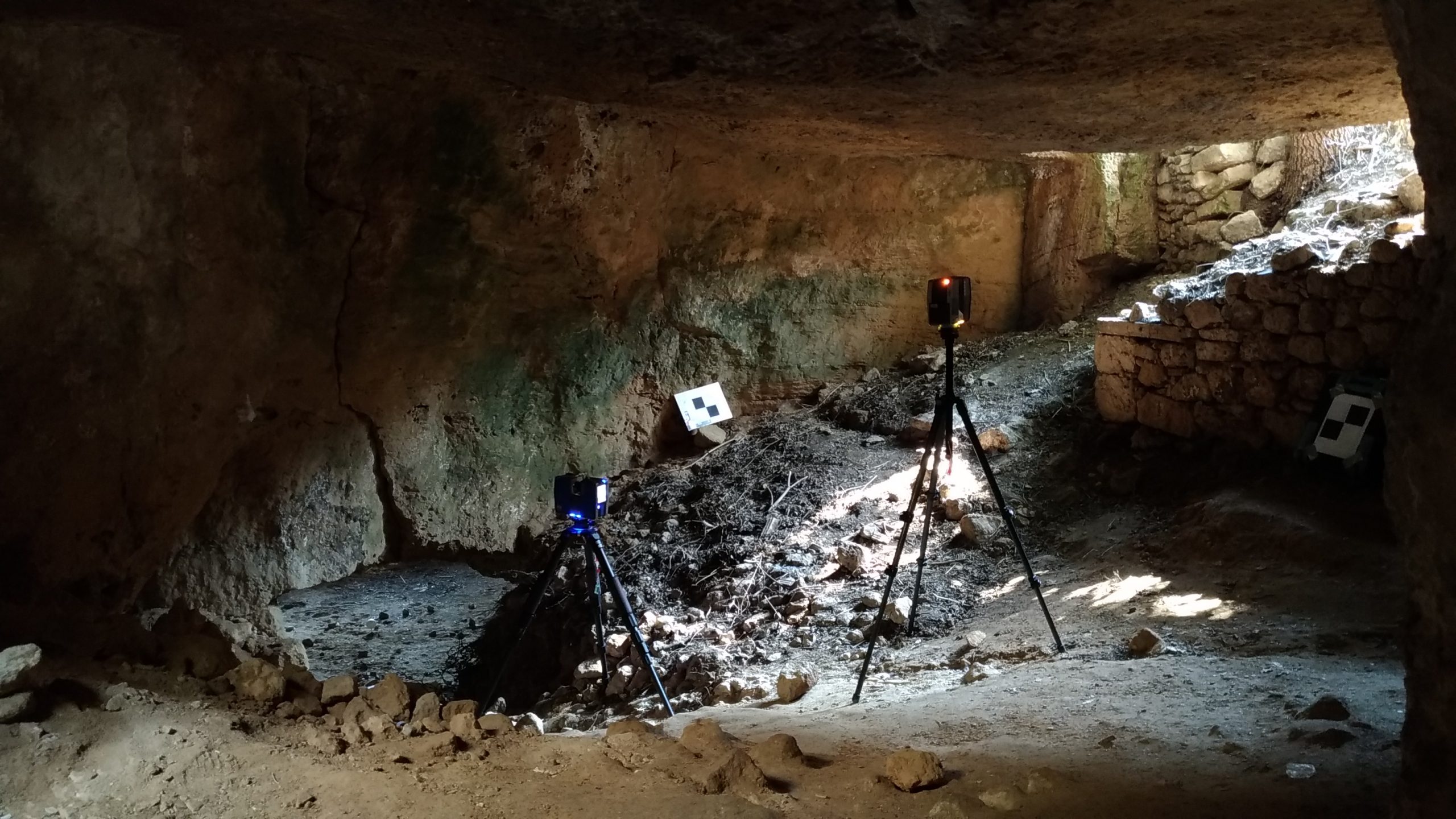
Heritage recording with laser scanners in an underground cave.
This webinar is organized collaboratively by the CIPA Emerging Professionals, International Council on Monuments and Sites, National Trust for Canada, and the NSERC Create Heritage Engineering Program.
Ethics of Heritage Recording
Accessing Heritage Places from Home Webinar
Date: Tuesday, July 28 at 12:00 – 2:00 pm ET / 6:00 pm CET
This event has already happened. Registration is closed. Sign up for the working group here.
In any professional association that serves the public interest, members have to abide by a number of ethical principles. This is currently missing in the heritage recording field.
Building on the CIPA and NSERC Create Heritage Engineering Ethics Panel organized in September at the International Symposium of Heritage Documentation (CIPA2019 in Ávila, Spain), this webinar will gather important emerging professionals in the field of heritage recording and conservation, including representatives from UNESCO, CIPA, the Getty Conservation Institute, The National Trust for Canada, ICOMOS, CyArk, Columbia University, Carleton University, and ICONEM. Many experts are affected by lockdown or reopening phases, and by the push to provide virtual, remote access to sites.
The experts will discuss the need for ethical principles (or a code of ethics) applicable to the heritage recording specialist in their conduct, responsibilities, and professional practice. Focus will be given to the heritage recording practice contributing to better planning, recording, processing, and dissemination of digital workflows for the conservation of historic places.
Furthermore, the panel will deal with the potential benefits of heritage recording, but also the profound respect that those creating these digital products are called upon to extend towards the public, the stakeholders and the communities associated with these historic places.
Panelist will cover the following topics:
- Conduct: A heritage recording project should have a confidentiality agreement between the recording specialist and the custodian of the site being recorded. The data recorded should not be used for the practitioner’s benefit and only with the permission of the site custodian. For example, the documentation workflow and outcomes, with permission could be presented at conferences, used in social media and/or to promote the skills of the heritage recording specialist.
- Responsibilities: The data collected and the outcomes that are disseminated must transcend our lifetimes and be accessible to future generations. How can we achieve this?
- Professional Practice Delivered Data: All captured and processed data should fulfill strict requirements and follow set guidelines. Following set standards will ensure that certain levels of quality will be met. For example, by using the Historic England’s Metric Survey Standards, the expert ensures their data can be verified.
Each panelist will address one or more of these issues, followed by questions from selected guests. After this, we will moderate a Q&A session with the audience. A closing statement will conclude the session.
The webinar results will lead to the drafting of an ICOMOS resolution for its next General Assembly to revise the 1996 Principles for the recording of monuments, groups of buildings and sites. To join the working group or to sign up for updates on the progress, please sign up here.
Panelists
Kacey Hadick, CyArk
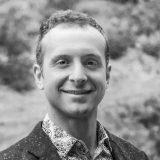
Kacey Hadick is an archaeologist and CyArk’s Director of Project Development. Kacey brings a decade of experience working in cultural heritage with a strong focus on working with local communities. He holds a masters in World Heritage and International Projects for Development from the University of Turin and a bachelor’s degree in Anthropology and Geography from California Polytechnic State University, San Luis Obispo. Kacey works to ensure that the digital products produced can be used to support site conservation and outreach activities. Kacey is involved from initial site scoping to project completion and is heavily involved in CyArk’s workshop and capacity building programs. His research interests include human impacts on the natural environment and the ways technology and culture can be used as catalysts for economic development.
|
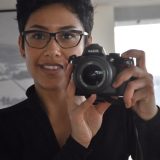
Julie Ivanoff is a graduate student and researcher at the Carleton Immersive Media Studio (CIMS), exploring the application of digital twin technologies at a regional scale. Her research focusses on the relationships between virtual-digital representations and their physical manifestations and how those transformations impact our understanding of place.
|
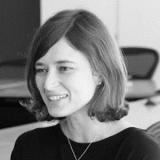
Elena Macchioni is an Italian-qualified architect and Ph.D. in Preservation of the Architectural Heritage from Politecnico di Milano. She holds a Master’s degree in Architecture and a Specialization Diploma in the Conservation of Architectural and Landscape Heritage from Università degli Studi di Genova. After working as a conservation architect in private practice in Italy for six years, she was a GCI graduate intern with the Earthen Architecture Initiative in 2013-14. She then worked for the Great Pompeii Project, contributing to the condition assessment of one area of the archaeological site, and further collaborated with the GCI as a consultant. In 2019, she joined the Getty Conservation Institute where she work with the Seismic Retrofitting Project and the Bagan Conservation Project.
|
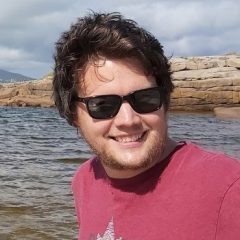
Will Megarry is a landscape archaeologist and geospatial specialist with a particular interest in the intersections between technology, heritage management and climate change. Originally from Dublin, Ireland, he is currently Senior Lecturer in GIS and Archaeology at the School of Natural and Built Environment, Queen’s University Belfast. He has worked at many heritage sites globally both as an archaeologist and heritage management specialist, and is an expert member of The International Scientific Committee on Archaeological Heritage Management (ICAHM). Between 2018 and 2019, as part of the Working Group on Climate Change and Cultural Heritage, he coordinated the Google Arts and Culture-funded Heritage on the Edge project for ICOMOS which utilised remote sensing technologies, video and audio interviews, and expert narratives from five World Heritage Sites to raise awareness and stress urgency about climate change. He has a particular love of islands and past island dynamics, and co-ordinates a long-running project on the Shetland Islands, exploring Neolithic stone tool production.
|
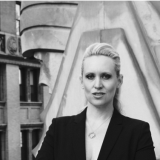
Dr. Emily L. Spratt is an art historian, technologist, and consultant. As a fellow at Columbia University in the Data Science Institute with sponsorship from the Program in Historic Preservation and the Department of Computer Science, Emily’s current research focuses on the philosophical and ethical implications of AI-enhanced technologies for the analysis, generation, and curation of art and architecture, and the uses of digital images in our society. Emily completed a Ph.D. and an M.A. at Princeton University in Byzantine and Renaissance art history, and also holds an M.A. from the University of California, Los Angeles, in Byzantine art history, and a B.A. from Cornell University in art history, religious studies, and psychology. At Rutgers University Emily has taught in the Department of Art History and in the Cultural Heritage and Preservation Studies Program. Additionally, Emily has been an advisor for Artory, Iconem, The Frick Collection and Art Reference Library, Ethical Tech at Duke University, the Artificial Intelligence Finance Institute, the Hellenic Ministry of Culture, the US Department of Defense through the Defense Innovation Accelerator, and other companies, institutions, and political entities. Emily’s insights on art, technology, and ethics have been sought by news outlets such as the Washington Post and CBS News.
|
Youmna Tabet, UNESCO

Youmna Tabet is Associate Project Officer at the Arab State Unit of the UNESCO’s World Heritage Centre, where her main area of focus is the safeguarding of World Heritage during conflicts and post-conflict reconstruction and recovery challenges. She is co-editor of the book “Five years of Conflicts: the State of Cultural Heritage in the Ancient City of Aleppo” which assessed damages in the city through satellite imagery and was published by UNESCO in 2018. She was working as architect in Lebanon and France before specializing in heritage conservation and protection, and joining UNESCO in 2008.
|
Yves Ubelmann, ICONEM

Just after being graduated from the Versailles School of Architecture in 2006, Yves Ubelmann works as an independent architect in Syria, Iran, Afghanistan and Pakistan. He carries out surveys and studies on various archeological sites until 2010. It gives him opportunity to develop in 2009 a new approach to photogrammetry for the survey of these sites.
From 2010 to 2011, he is employed as a specialist engineer at the Microsoft Research – INRIA joint center, with the computer science department of the École Normale Supérieure. He then develops the different 3D scanning methods based on recent photogrammetric reconstruction algorithms.
In 2013, he found Iconem, start-up specializing in the digitization of endangered archeological and heritage sites. Today, Iconem is active in around 30 countries, and it aims to produce ultra-realistic digital doubles of archeological and heritage sites around the world. Combining several 3D scanning techniques with the use of drones, Iconem has already digitized many iconic heritage sites (The Saint Jacques Tower in Paris, Pompeii in Italy, Delos in Greece, Mes Aynak in Afghanistan, Palmyra in Syria, Angkor in Cambodia, etc.). These missions are carried out on behalf of major museums (the Louvre, Rmn-Grand Palais, National Museum of Singapore, etc.), international institutions (UNESCO, World Bank, UNOSAT, etc.), archaeologists (French School of Athens, Casa de Velazquez, SFDAS, etc.) or governments and local authorities (Mairie de Paris, French Institute of Burma, Oman Ministry of Heritage and Culture, etc.).
|
Commentators
Prof. Dr. Mona Hess, Chair for Digital Technologies in Heritage Technologies, University of Bamberg
Prof. Andreas Georgopoulos, CIPA Vice-President, National Technical University of Athens
Dr. Mechtild Rössler, Director of the UNESCO World Heritage Centre
Prof. Alex Ya-Ning Yen, CIPA Vice-President, China University of Technology
Opening and Closing Remarks
Prof. Mario Santana, ICOMOS Vice-President, CIMS, Carleton University
Laurie Smith, NSERC CREATE Heritage Engineering, CIMS, Carleton University
Prof. Stratos Stylianidis, CIPA President, Aristotle University of Thessaloniki
Chris Wiebe, Manager of Heritage Policy and Government Relations at National Trust for Canada
Organizers
Efstathios Adamopoulos, CIPA EP, University of Turin
Michelle Duong, CIPA EP, Carleton University, National Trust for Canada, NSERC CREATE Heritage Engineering Program
Joe Kallas, CIPA EP
Prof. Rebecca Napolitano, CIPA EP, Penn State University
Event Poster
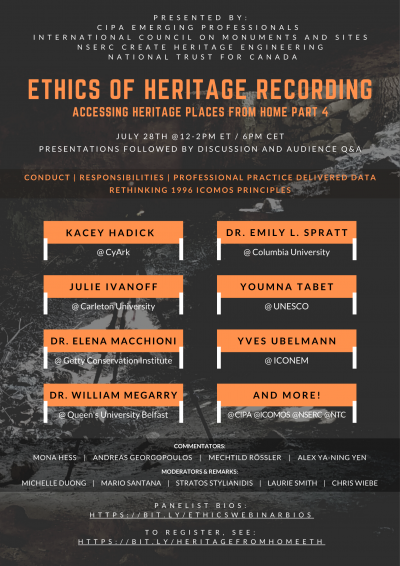 Click on the poster to download the PDF. |
This event has already happened. Registration is closed.
Please note, the first 500 participants will be admitted to the webinar and a link to the recording will be sent out the following day to all registrants. Thank you for your interest and participation!
Wednesday, July 15, 2020 | Categories: News
Share: Twitter, Facebook
Short URL:
https://carleton.ca/heritageengineering/?p=1381








